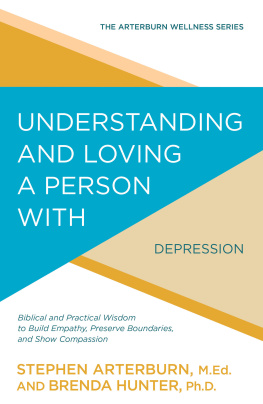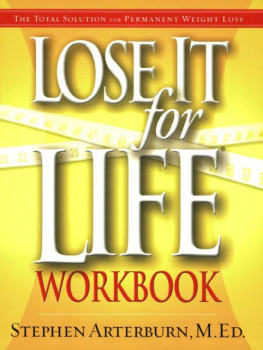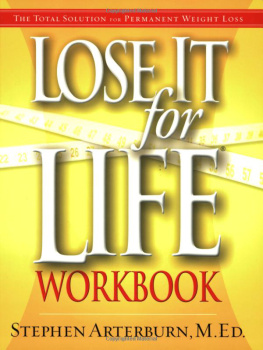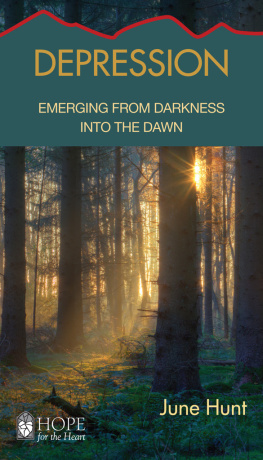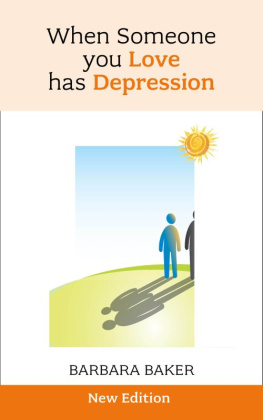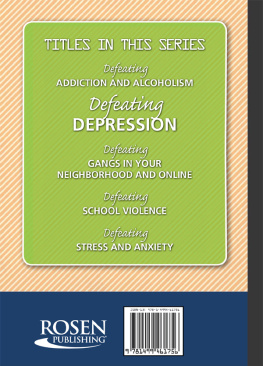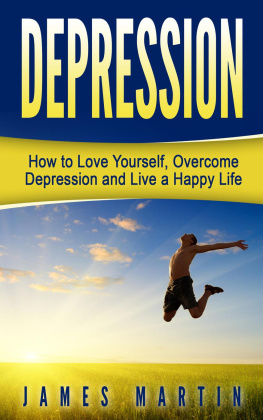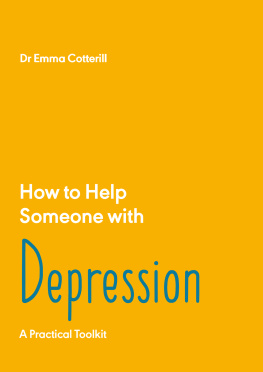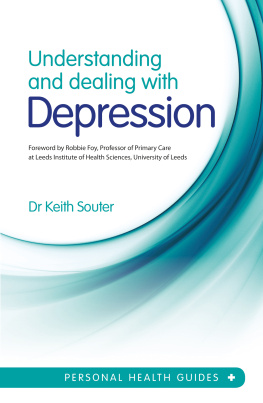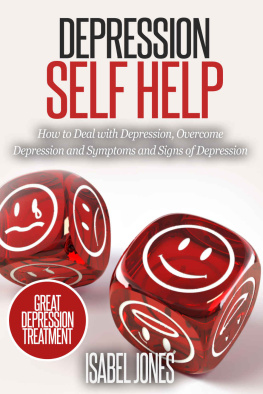UNDERSTANDING AND LOVING A PERSON WITH DEPRESSION
Published by David C Cook
4050 Lee Vance Drive
Colorado Springs, CO 80918 U.S.A.
David C Cook U.K., Kingsway Communications
Eastbourne, East Sussex BN23 6NT, England
The graphic circle C logo is a registered trademark of David C Cook.
All rights reserved. Except for brief excerpts for review purposes, no part of this book may be reproduced or used in any form without written permission from the publisher.
The website addresses recommended throughout this book are offered as a resource to you. These websites are not intended in any way to be or imply an endorsement on the part of David C Cook, nor do we vouch for their content.
Details in some stories have been changed to protect the identities of the persons involved.
Unless otherwise noted, all Scripture quotations are taken from the Holy Bible, new international version , niv . Copyright 1973, 2011 by Biblica, Inc. Used by permission. All rights reserved worldwide. new international version and niv are registered trademarks of Biblica, Inc. Use of either trademark for the offering of goods or services requires the prior written consent of Biblica, Inc. Scripture quotations marked esv are taken from the esv Bible (The Holy Bible, English Standard Version), copyright 2001 by Crossway, a publishing ministry of Good News Publishers. Used by permission. All rights reserved; nlt are taken from the Holy Bible, New Living Translation, copyright 1996, 2007 by Tyndale House Foundation. Used by permission of Tyndale House Publishers, Inc., Carol Stream, Illinois 60188. All rights reserved.
LCCN 2017935676
ISBN 978-1-4347-1054-3
eISBN 978-1-4347-1236-3
2017 Stephen Arterburn
The Author is represented by and this book is published in association with the literary agency of WordServe Literary Group, Ltd., www.wordserveliterary.com.
Cover Design: Amy Konyndyk
Cover Photo: Getty Images
First Edition 2017
1 2 3 4 5 6 7 8 9 10
072817
I wish to dedicate this book to my husband, Don a faithful, committed, and stalwart man
Contents
Introduction
Im so glad youve chosen this book on depression from the Arterburn Wellness Series. The series is designed for you, the person who has a loved one or friend who is perhaps facing the lowest point of his or her life. While this book has been written for you, the caregiver, theres valuable information for the depressed person in your life as well.
Before I introduce you to Brenda Hunter, the writer of this book, I want to share my own brushes with depression. As the radio host for New Life Live, a one-hour call-in show that is on every day, Ive talked to literally thousands of callers who were either in the middle of depression themselves or trying to help a loved one.
Depression is a very real malady. I should know; Ive been there.
In my familys West Texas culture, we did not go to see counselors. You took care of problems inside of your fence. As I look back on it now, it was like we felt we needed to lie or deny the reality of our struggles if it would make Jesus look better. Growing up like that, I shared very little of what troubled me, and I lived feeling isolated and detached from nearly everyone around me. At age eighteen, I had some very painful, ungrieved, and unresolved losses from a heartbreaking experience, one like Ive never experienced since. I was struggling to survive and had no idea the shame-filled way of life was a result of not dealing with my depression.
When I went to see a physician at Baylor University Hospital, I thought I should simply get a B-12 shot like my mother had takensomething that could give me some energy. After talking with me for a few minutes (without my taking off my sunglasses), the doctor told me she believed I was depressed. She asked if I was safe, and, of course, I told her I was.
But I was not.
I wanted to die, and if I had had access to pills, I would have taken them. I knew that would have stopped my pain. Violent ways of ending it all werent for me I was too afraid of blood.
I found out later that suicide sometimes runs deep in a family tree. Sadly, when it is in your family, it becomes more of a tangible option than if no one has tried or succeeded.
Suicide had happened in my family.
My grandfather was treated for depression with electroconvulsive therapy (ECT) long before people were sedated prior to going through it (as they are now, though it is used infrequently). It helped him for a while, but he vowed he would never go back to that facility in Dallas and experience the horror of ECT. When the depression sank back in, he lived up to his words. He ended his life at the barrel of a gun. My mother found him in the garage under the car. In the wake of his death, he left our family and small church congregation confused, broken, humiliated, and full of shame. I didnt find out about what had really happened to my grandfather until I was a senior in high school.
Knowing the story of my grandfathers despair did not cause me to realize I was suffocating in my own depression. And I didnt know I should seek help for it. The physician at the Baylor Clinic saw that I was depressed and put me on an old antidepressant named Elavil. I took it, felt numb, and gained about thirty pounds. That is what the medication did back then. Fortunately, there are more effective medications without a weight-gaining side effect. I hated that medication, but it likely saved my life.
There would be two other times in the future when fighting depression would be my most important battle. I survived all three acute episodes, but not by much.
Like many other depressed strugglers, I did not really want to die. I just wanted the pain to go away. And I wanted the world and all the people to go with it. It was a dark and dismal misery that I suffered alone and in isolation. Those who loved me and those who lived with me didnt understand what I was going through. Their trite suggestions, superficial scripture quoting, and the sometimes spiritual arrogance seeping out of their pores truly made matters worse. Whatever shame I was carrying before the depression, and the shame of being depressed and not able to pull myself up by my bootstraps, only deepened my depression and feelings of isolation.
Most of these people cared for and truly loved me. They just didnt know what to say or do. I think back on my own life, the people I tried to help early on as a social worker, and I realize that I really had about half a clue as to what to say or do to help them. To people whom I genuinely loved, I offered superficial and unhelpful words instead of giving them what they needed: compassionate wisdom (not blundering platitudes). Like so many of us, I felt the need to say something when it would have been best to just be present without any failed attempts at being helpful.
If you are living with and loving someone with depression, you may have said a thousand inadequate words. Perhaps you are still feeling a myriad of negative emotions like anger, frustration, hopelessness, and despair. You are not alone. It is much more common to be ill-equipped in the face of depression than to be adequately prepared to understand, express appropriate compassion, and even be able to utter something that might help. That is the reason for this series, and especially this one on depression.
It is my desire that when you finish this book, it will have at least three results:

